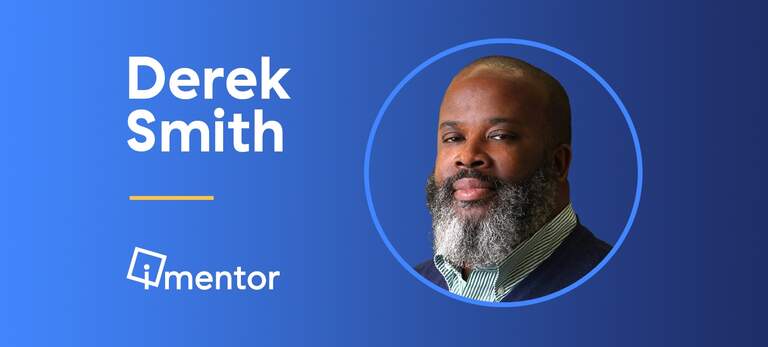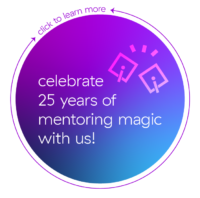Thousands of iMentor students have been navigating a triple pandemic for months—Covid-19, an economic downturn, and systemic racism. Our chief regional officer, Derek Smith, recently had a conversation with Michelle Tsai, director of marketing and communications, to explore what these challenges mean for iMentor students and for iMentor, and how mentors are stepping up for mentees at this time.
Derek joined iMentor earlier this year from Bridgetown Leaders, where he served as founder and executive director. While at Bridgetown, Derek led the organization in providing school leaders of color with culturally relevant and results-driven executive coaching and mentoring. Derek previously served as chief program officer at Turnaround for Children, leading the expansion of Turnaround’s program to help school, network, and district leaders across the country address the impact of stress and trauma on children’s learning and development. He has also held leadership roles at KIPP and New Visions for Public Schools. Derek is a proud father, husband, and mentor with a B.A. from Dartmouth College.
What brought you to iMentor?
At a young age I was blessed with strong relationships with adults who were able to guide me academically, professionally, and socio-politically. I felt it was normal to have a series of “sherpas” in your life to help you navigate large and small decisions. As I got older and started hanging out with different people in different cities, I quickly realized that what I experienced was not something that everybody else had access to.
Over and over again, in my professional and personal relationships, I saw a difference between those who were as fortunate as I was to have those connections and those who were not.
As someone who's been in education for all these year, working primarily in NYC but also in DC and in Philadelphia, in some of the most marginalized and disenfranchised communities, that connective tissue was stickiest for students when they were able to leverage strong relationships where they were heard, respected, empowered and supported.
When you could see those connections, whether between teacher and student, principal and student, or community-based organization lead and student, those students had much greater outcomes, ranging from attendance to academic performance, to graduation and high school and college persistence.
During what feels like a triple pandemic of Covid-19, racial injustice and the political season that we're in, it is an incredible time for me to join an organization that has strong relationships as its core and evidence to back up the power of the model—an organization that is on the front lines of helping young Black and Latinx students achieve all the things that they deserve.
How is the triple pandemic reshaping higher education and high school?
Prior to this time, young students and families and educators were asking themselves, “What does success look like?” This is the first generation projected to make less money than their parents.
Some argue, rightly so, that the college path will open doors that no other path can. That is true for some students. For others, a professional pathway will be the better path for them, short-term or long-term.
During this triple pandemic, students are also asking what’s most important today. Thinking four years ahead seems to be a luxury for many people when, for some, there's the reality of hunger, homelessness, or hospitals. For those folks, they're looking for people and resources to support them right now, to navigate a terrain of uncertainty and a lot of loss and trauma.
Everybody is struggling right now to figure out what's next. Imagine a 17-year old trying to figure this out on their own—that is very concerning. To be able to have someone supporting them throughout that is so important. An organization positioned to provide those layers of support to thousands across the country is really powerful and impactful.
How are our mentors responding?
There is excitement and commitment to being the guides, the rocks for so many youngsters during these difficult times, when our youth are looking to hold on to something and it seems like nothing is nailed to the ground.
For many of our youngsters, some of the stability and balance they're looking for in relationships with adults is not there. For our mentors, for the last 20 years and certainly during this triple pandemic, being able to serve as that pillar and to guide and support mentees is something they see as a profound responsibility and privilege.
The other truth that our mentors are holding is their own struggle with uncertainty, from financial stability to social and emotional struggles as a result of the triple pandemic. We know that anybody who needs to help others needs to feel whole themselves to be successful in helping someone else.
All of those who were once sitting in positions of stability and familiarity and expertise are needing to navigate this land of uncertainty at the same time. So the jury is still out on our ability to hold both truths to our heart and be effective in taking care of ourselves so we can take care of others. I also mentor in my own personal life, and is it as critically important for me to work on my own equanimity and balance so I can help others.
Learn how the pandemic has affected first-generation college students. iMentor has launched the Collective Response Fund so that we can invest in four areas to support students and meet the unique challenges of the year ahead.

